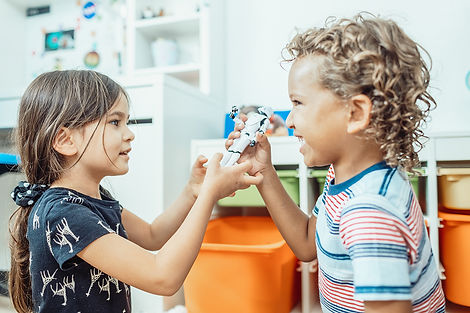
THERAPY & EVALUATIONS
OCCUPATIONAL THERAPY
Our occupational therapy sessions are interactive, creative, and playful! It is our goal to help your child develop new self-help, fine motor, and emotional and sensory regulation skills while engaging in activities that they enjoy.
Evaluations
Your occupational evaluation will begin by establishing trust with your child so they are comfortable engaging in the evaluation. OT evaluations will include:
-
A parent or caregiver interview
-
Review of your child's medical and developmental history
-
Child observations
-
Direct engagement in play
-
Conversation with your child
-
Play-based and informal assessments
-
Formal standardized testing
The goal of this session is to gain an understanding of your child's current skill levels and areas of need so we can develop a plan to help them achieve their goals.
Following the evaluation, you will receive a written report with our findings and recommendations. If your child qualifies for occupational therapy services, we will determine a time and frequency for therapy sessions that work for your family!
our approach to occupational therapy
Just like every child is different, so is every therapy session! We tailor your child's occupational therapy sessions to meet your child's unique interests, strengths, and needs so that their sessions are truly motivating and effective!
Our pediatric occupational therapists will model strategies for your child and also teach you how to model these same strategies at home. We also always have a way to support your child's sensory and emotional regulation. Parent education, coaching, and involvement are a huge part of therapy so you will never leave without knowing what we are working on in OT, and why. Your ability to implement these strategies with them in your natural environment will be the most essential piece of OT.
Occupational therapy activities may include:
-
Pretend play scenarios and toys
-
Arts, crafts, and sensory play
-
Climbing, jumping, and swinging in the gym
-
Sensory activities that may involve s deep pressure, heavy work, weighted vests, and movement

Self-Regulation and Sensory Regulation
Self-regulation is a child's ability to regulate their own emotions and responses. This includes emotional awareness, coping strategies, and managing emotions.
Sensory regulation is closely tied to self-regulation as children experience emotional and behavioral responses when faced with aversive stimuli such as non-preferred foods and textures, sensitivity to lights, sounds, or noises, and/or touch.
We will focus on sensory-based activities through fun and play, as well as education to help your child:
-
Identify, label, and understand their emotions
-
Recognizing emotions in others
-
Develop coping strategies to manage their responses
-
Manage conflict
-
Interpreting social situations
-
Increase comfort with aversive stimuli such as during dressing, feeding, etc.
Greater emotional and sensory regulation will have a positive impact on your child's social skill development, empathy, and interactions with peers and family.
Executive Functioning
Occupational therapy for executive function skills will include a mix of child education, practice through play-based activities, and parent education. If your child experiences difficulty with areas such as planning, attention, organization, memory, self-control, time management, or starting and/or completing tasks, occupational therapy can help your child learn these important skills.
With the use of games and fun activities, your child will help your child:
-
Develop greater independence in daily routines such as toileting and dressing
-
Attend to activities for longer periods of time
-
Develop problem-solving, organizational, time management, and planning skills
-
Learn self-advocacy skills
-
Increase their independence with school and homework
Your occupational therapist will also provide you and your child with strategies to implement at home.


Fine Motor Skill Development
Occupational therapy for fine motor skill development will help your child to engage in a variety of age-expected skills and "occupations". Your occupational therapist will work on skills such as:
-
Visual motor skills and visual perceptual skills
-
Grasp for holding pencils and crayons
-
Coordination for using two hands together, manipulating objects, using utensils, and writing
-
Developing strength and endurance for fine motor activities
-
Ability to manage fasteners such as buttons, zippers, etc.
We will work on these fine motor skills through a variety of play-based activities while also providing parent education on how to further the development of these skills at home.
Social Skill Development
Occupational therapy focused on social skill development sessions will help your child learn skills to engage with others, play games, and play. Your child's occupational therapist will teach and model social skills through games and interactive activities. We will also focus on building confidence, and self-esteem, and managing any anxiety your child may be experiencing surrounding social interactions.
Occupational therapy for social skills will help your child:
-
Develop confidence and increased self-esteem
-
Learn skills for engaging in games with others
-
Develop and implement positive coping skills and sportsmanship when things don't "go their way"
-
Managing peer interactions and friendships
-
Learn self-advocacy skills

